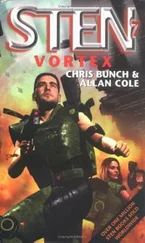Maj. Jorge de Sousa had seen bodies before-hundreds, it seemed. Like these, most of the dead had been simple, unarmed Mozambican peasants, but these villagers hadn’t been shot by Renamo guerrillas. They’d been gunned down by socalled allies” guarding a Cuban supply depot.
There were a dozen such depots, each carefully hidden among the low, brush-choked hills surrounding Pessene. Each supply dump held a sizable fraction of the food, fuel, and ammunition needed to support the Cuban tanks, motorized rifle troops, and artillery moved into Mozambique over the past four weeks.
Each was guarded by a platoon or more of soldiers, a mixed
unit of Cubans and Libyans stationed together to foster “fraternal socialist awareness.” Or so their political officers had claimed. Well, de Sousa thought coldly, these troops certainly didn’t look fraternal. They stood clumped in distinct national groupings while he and Lieutenant Kofi inspected their victims.
There were five bodies-two men, two women, and a teenage boy. All were pathetically thin, almost skeletal, dressed in rags that passed for clothing. They’d been shot for trying to steal a fifty-kilo sack of rice.
The rice bag, no different from hundreds of others piled high throughout the supply dump, lay nearby, also displayed as evidence. Apparently it had taken all five of them just to pick it up and carry it, a sign of their weakened condition.
The Cuban lieutenant in charge of this detail explained in Spanishaccented
Portuguese, “We heard a noise last night and fired a flare. Then we saw these thieves trying to make off with the rice, so we arrested them. And then we shot them.” Smiling, he motioned toward the row of corpses, slowly lowering his arm when he saw no praise forthcoming from de Sousa.
The Mozambican major turned on his heel and walked over to the Libyans.
Their uniforms were the same dark khaki color, but had a different cut, and they wore billed caps instead of the soft, floppy “sun hats” of the Cubans.
Both groups were armed with AK-47 assault rifles.
Their apparent leader, if de Sousa understood the Libyan’s rank insignia, was a sergeant whose dark-skinned face seemed locked in a perpetual scowl.
Without saying anything he looked the major up and down as he approached.
Finally, prompted by a glare from the Mozambican officer, the Libyan reluctantly came to attention and tossed off a salute that was almost grounds for a charge of insubordination.
De Sousa tried Portuguese, then English, even Tsonga, without getting any intelligible response. As a Moslem from one of Mozambique’s northern provinces, Kofi had more luck with his Tsonga-accented Arabic. The sergeant gave slow responses to the lieutenant’s questions.
Kofi turned to de Sousa.
“He says they have orders to execute anyone who tries to steal from the supply dumps, Major. “
De Sousa sighed wearily. His orders had been to guard the dumps, using force only if necessary. Someone else had obviously amplified those orders considerably.
When he’d been made responsible for the security of these supply dumps, he’d thought he would be protecting them from Renamo attacks-not from his own countrymen. But the guerrillas had stayed clear, scared off by each depot’s defenses. Instead, starving villagers had flocked to the area -drawn by rumors of vast stockpiles of foodstuffs.
Everyone in Mozambique was starving. If you chased peasants away, twice as many would return. If you arrested them, you’d have to feed them with food you didn’t have, or dip into the supplies you were supposed to protect. And if you used up these supplies, the Cuban column slated to attack South
Africa from Mozambique might not be able to reach its objectives.
It was what an American would call a catch-22, de Sousa thought. Then he shrugged. Americans always thought every problem had to have a solution. As a Mozambican, he knew that wasn’t true.
The men in Maputo had thrown in their lot with Cuba’s grand strategic gamble. And that meant that almost every truck, every railroad car, and every cargo plane coming into their country carried military supplies-not foodstuffs for civilian consumption. Until the Cubans completed their logistical buildup and launched their attack, Mozambique’s peasants would suffer.
De Sousa ordered the bullet-riddled bodies returned to their nearby village for burial, knowing only too well that the Cuban and Libyan guards would probably just dump them out in the brush, somewhere out of sight and smell.
This massacre was the third such incident. De Sousa hoped it would be the last, but doubted it. He could only hope Vega’s planned offensive would start soon, not only so that the South Africans would be defeated, but also so that starving peasants wouldn’t have these sources of fatal temptation dangling in front of their faces.
His eyes wandered over row after row of stockpiled rations, fuel drums, boxes of small-arms ammunition, and stacks of shells. The Cuban Brigade
Tactical Group concealed in the surrounding hills had to be almost ready to move. His friends in Maputo told him that the flow of Soviet ships and cargo planes had slowed to a trickle. And inspection visits by high ranking officers had dramatically increased-all sure signs of impending action.
Good, he thought, returning the guard detachment’s careless salute, the sooner these “socialist brothers” of ours are busy killing Afrikaners, the sooner we will have our country back. Nevertheless, as he climbed into his jeep for the long ride back to headquarters, de Sousa couldn’t help wondering if this Cuban “cure” wouldn’t turn out to be just as bad as the South African “disease.”
CNN HEADLINE NEWS
The satellite feed from Windhoek had all the elements of good television news: a sweeping analysis of the military situation in Namibia by a veteran reporter, the panoramic backdrop of a war-menaced city, and even the grim image of a T-62 tank parked in full view. Millions of viewers around the world were being given a real-time glimpse of what a commentator had already called “one of the century’s most bizarre military conflicts.”
Clad in a belted khaki field jacket with his press credentials prominently displayed, the CNN correspondent looked almost more like a soldier than did the openly curious Cuban tank crewmen perched atop the
T-62’s turret and rear deck.
“After weeks of comparative openness in its dealings with the Western news media, Castro’s army has begun cracking down. Security at Namibia’s busy ports and airfields has been increased.
All front line passes for journalists have been revoked. And the commander of this growing army, Gen. Antonio Vega, has dropped completely out of public view. Sources close to the Namibian government report the general is now at his forward field headquarters-somewhere in the mountains outside this capital city.”
“The reporter pointed toward the Soviet-made tank behind him.
“Other sources report seeing large columns of armored vehicles like this T-62 rolling south on Namibia’s highways or parked in heavily defended staging areas. And everyone in Windhoek has grown used to hearing the constant, day and-night roar of massive Soviet cargo planes ferrying still more men and equipment into this small African nation.”
He faced the camera squarely.
“One thing seems clear: the preparations for Cuba’s long-expected counteroffensive are in their final stages.
Though only Fidel Castro and his generals know the precise day or hour, no one can doubt that their soldiers will soon strike south, trying to drive South Africa out of this battered and bleeding country.”
Vega’s elaborate deception plan was working. The Western news media, like
South Africa’s intelligence services, were seeing exactly what they expected to see.
Читать дальше












